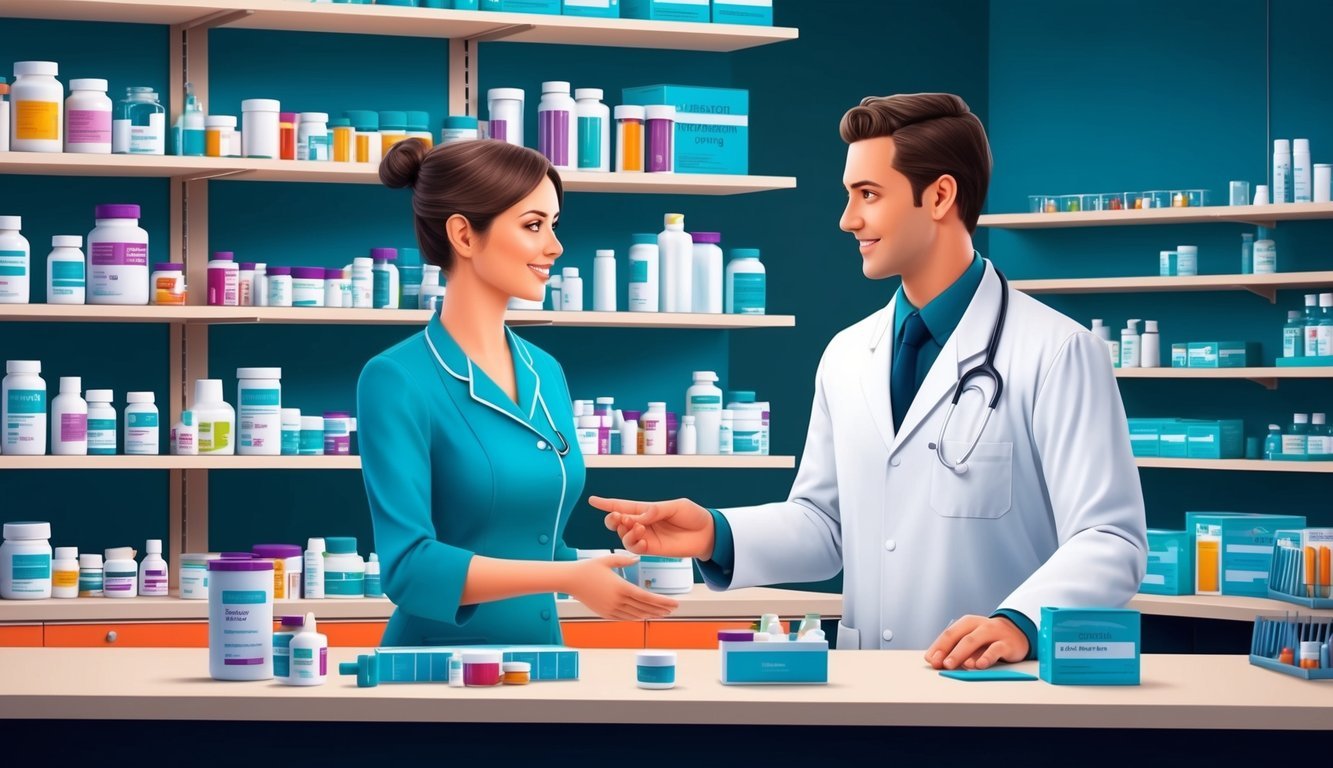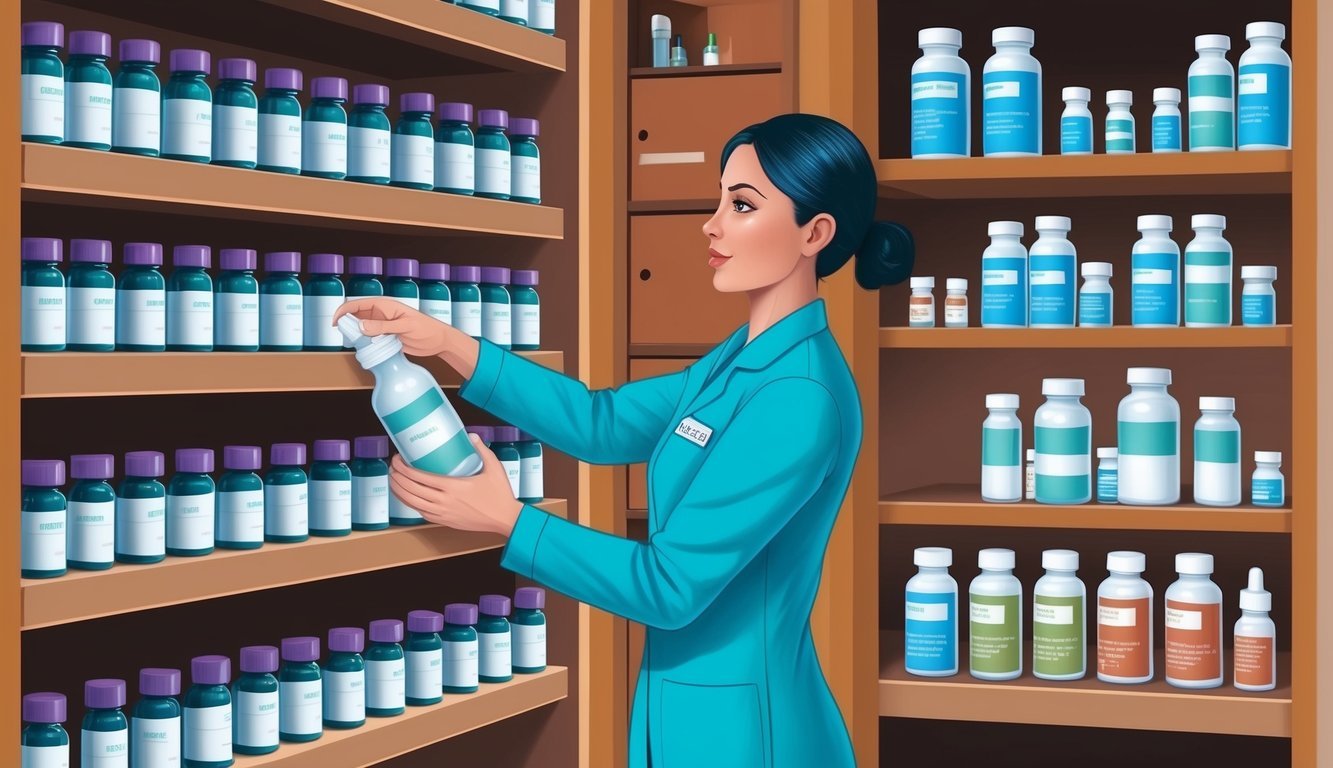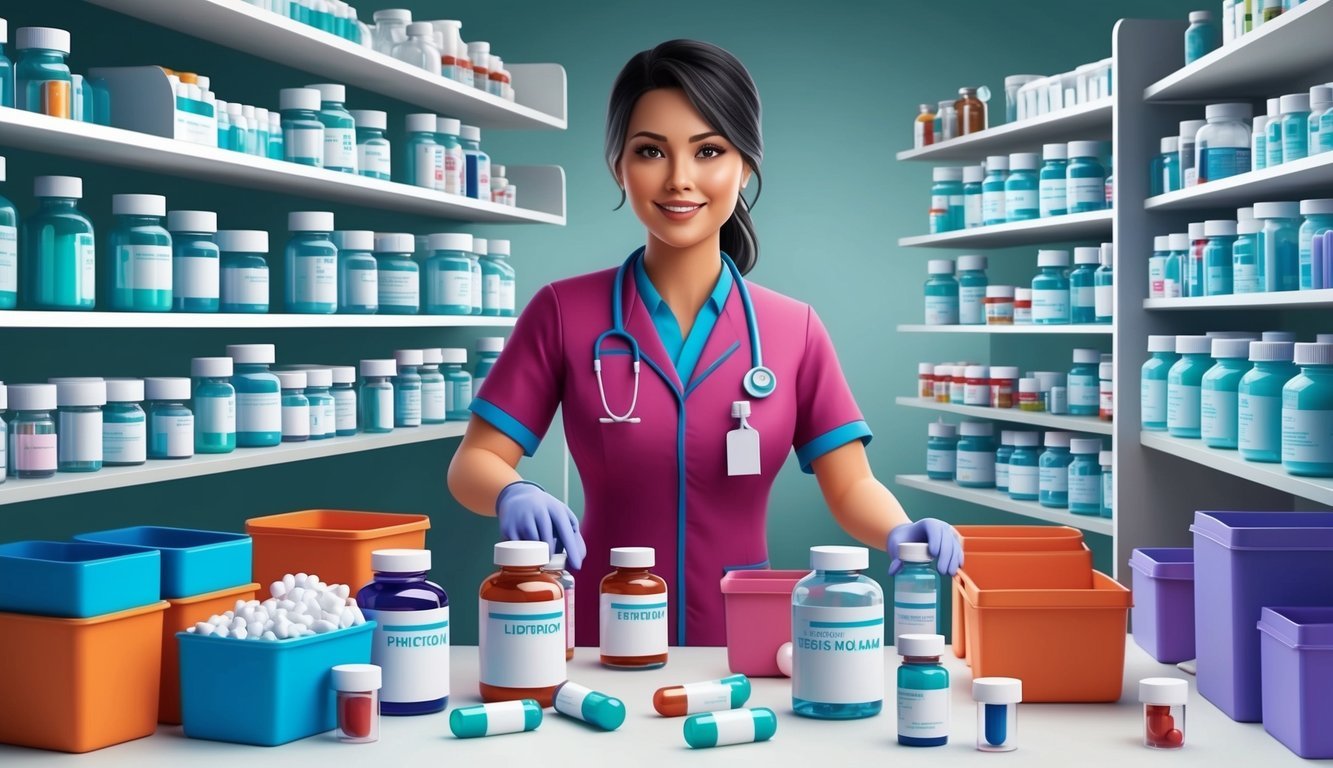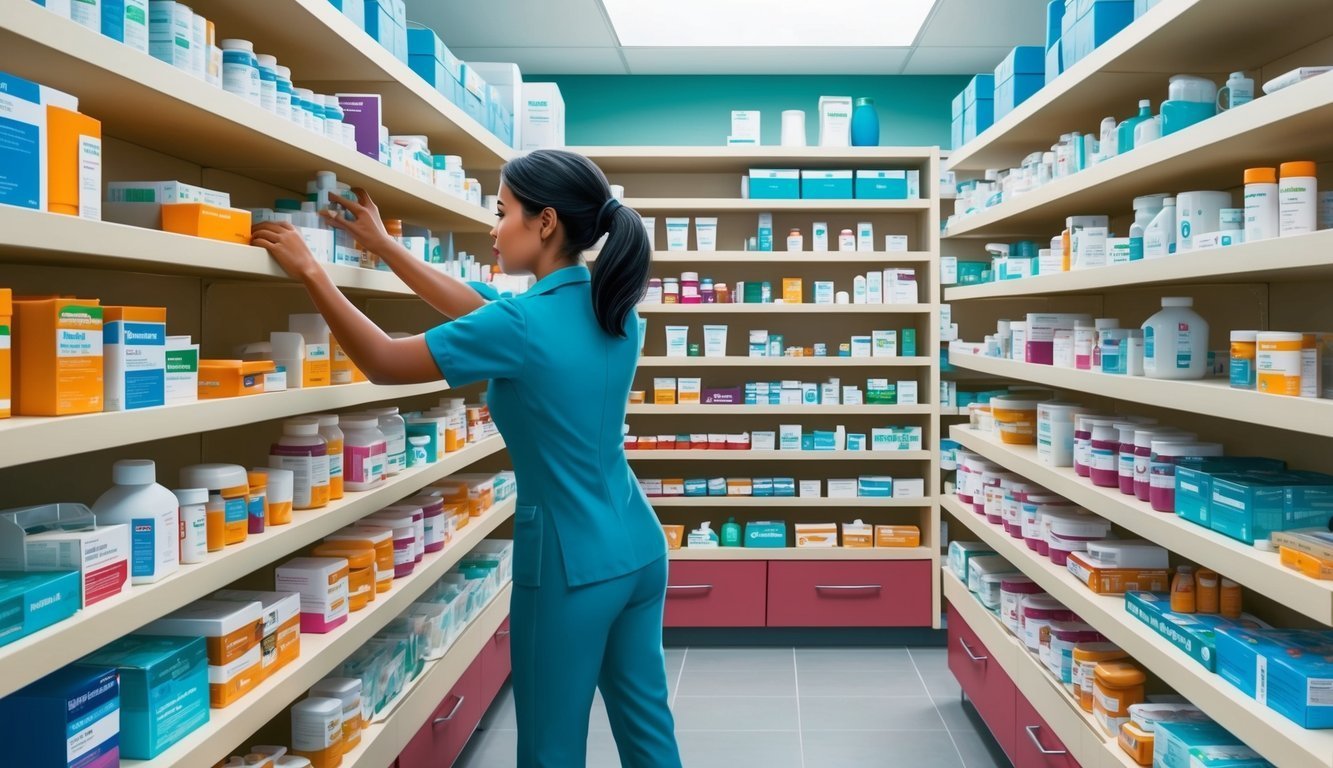Pharmacy technicians play a crucial role in your health care team.
They assist pharmacists in managing prescriptions and ensuring that you receive the correct medications in a timely manner.
With their diverse responsibilities, pharmacy technicians help improve patient care and support pharmacy operations in various settings, from retail pharmacies to hospitals.
If you’re curious about how to become a pharmacy technician or want to understand their day-to-day tasks, this article will provide you with essential insights.
You will learn about their training, job responsibilities, and the various environments in which they work.
Understanding this profession can illuminate the vital part pharmacy technicians play in your community’s healthcare system.
Key Takeaways
- Pharmacy technicians support pharmacists in delivering medication and patient care.
- They can work in diverse settings, including retail and hospital pharmacies.
- Training and continuing education are essential for career advancement in this field.
Becoming a Pharmacy Technician

To become a pharmacy technician, you need specific education, certification, and licensure.
These steps ensure you have the knowledge and skills necessary to perform in this vital healthcare role.
Education Requirements
To start your journey, you typically need at least a high school diploma or GED.
Some positions may require an associate’s degree or completion of a pharmacy technician training program.
Many programs offer hands-on experience and cover essential topics like pharmacology, medication safety, and pharmacy law.
You can find accredited programs through community colleges or technical schools.
Completing a diploma program can be beneficial in preparing you for certification.
This is crucial, as it sets you apart in a competitive job market.
Certification Process
Becoming a certified pharmacy technician (CPhT) involves passing the Pharmacy Technician Certification Exam (PTCE) or an equivalent exam.
The certification from the Pharmacy Technician Certification Board (PTCB) is widely recognized.
To be eligible for the exam, you must have completed a training program or have at least 500 hours of work experience.
The exam tests your knowledge of pharmacy practices, medication dispensing, and patient safety.
Once certified, you should keep track of recertification requirements, as they often involve continuing education.
Licensure
In many states, you need a license to work as a pharmacy technician.
The requirements for licensure can vary widely.
Some states require you to pass a state-specific exam, while others may only need proof of your certification.
You should check your state’s board of pharmacy for details on the application process.
Maintaining your license usually involves completing continuing education every few years.
Some employers may have their own additional requirements, which can affect your application.
Pharmacy Technician Roles and Responsibilities
As a pharmacy technician, you play a vital role in the healthcare system.
Your tasks involve managing prescriptions, interacting with customers, and handling insurance claims, all while ensuring medication safety.
Prescription Management
In prescription management, you handle processing prescriptions from healthcare providers.
This includes verifying patient information, assessing medication doses, and preparing medications for dispensing.
You must also check for potential drug interactions and allergies.
Maintaining accurate records is crucial to ensure that patients receive the correct medication.
When working with hazardous drugs, you must follow specific safety protocols.
This helps mitigate risks during preparation and dispensing to ensure patient safety.
For guidelines on handling prescription medications, refer to the National Pharmacy Technician Association.
Customer Service and Patient Interaction
In your role, you also provide customer service and interact with patients.
You are often the first point of contact in a pharmacy.
This means you must greet patients warmly and assist with any questions they might have about their medications.
Listening to patients’ concerns is key to providing quality service.
You may explain how to take prescriptions, answer queries about side effects, and assist with over-the-counter medications.
Building trust is important, as it encourages patients to return for future needs and ensures they follow medication guidelines.
For tips on effective communication, check the resources at WebMD.
Insurance Claims and Administrative Duties
Handling insurance claims is another critical responsibility.
You process claims for medications, ensuring all documentation is complete and accurate.
This involves verifying patient insurance details and resolving any issues that arise.
Administrative duties include managing inventory and ordering stock.
Keeping track of medication levels helps prevent shortages.
You also help maintain a clean and organized work area, which supports a safe and efficient pharmacy environment.
For more information on pharmacy technician responsibilities, visit Indeed.
Pharmacy Work Environments
Pharmacy technicians work in various settings, each with unique responsibilities and demands.
Understanding these environments can help you decide where you might fit best in your career as a pharmacy technician.
Retail Pharmacy Technician
As a retail pharmacy technician, you’ll typically work in community pharmacies, such as chain stores or independent shops.
Your main duties include filling prescriptions, providing customer service, and managing inventory.
In this environment, you’ll often interact directly with patients.
This means you must communicate effectively and handle inquiries regarding medications.
Key responsibilities:
- Processing prescriptions: Accurately filling and verifying medication orders.
- Customer interaction: Answering questions and helping customers understand their medications.
- Inventory management: Keeping track of supplies and ensuring stock levels are adequate.
Working hours can vary, but you may encounter a mix of shifts, including weekends.
For more information on retail pharmacy technician roles, you can refer to Pharmacy Technician Guide.
Hospital Pharmacy Technician
In a hospital setting, pharmacy technicians work alongside pharmacists to provide medications to patients within the facility.
This role often includes preparing intravenous medications and managing complex drug therapies.
You’ll gain experience with specialized equipment and protocols that are crucial for patient safety.
Working in this environment can be fast-paced, as you may need to deliver medications quickly.
Key responsibilities:
- Medication preparation: Assisting in preparing medications, including intravenous solutions.
- Collaboration with healthcare professionals: Communicating effectively with doctors and nurses.
- Inventory control: Monitoring medication supplies and avoiding shortages.
Hospital pharmacy technicians often work varied shifts, including nights and weekends, to support patient care.
Additional details can be found at CareerExplorer.
Specialized Pharmacy Technician Roles
Specialized pharmacy technicians work in niche areas of pharmaceuticals, including nuclear pharmacy and pharmaceutical sales.
In these positions, your tasks may range from compounding medications to maintaining safety protocols.
Examples of specialized roles:
- Nuclear pharmacy technician: Preparing and dispensing radioactive materials for diagnostic tests and treatments.
- Pharmaceutical sales technician: Supporting sales teams with product information and customer support.
These roles may require additional training or certification.
Working in specialized settings can offer higher pay and unique challenges.
For more insights on specialized roles, check Ultimate Medical Academy.
Advancement and Continuing Education
As a pharmacy technician, you have various paths for career growth and educational opportunities.
Focusing on advancement and ongoing training can lead to better job positions and higher salaries.
Career Advancement Opportunities
Advancement in your pharmacy technician career can improve your job satisfaction and wages.
You can pursue roles such as Senior Pharmacy Technician or Pharmacy Manager.
Here are some options for advancement:
| Position | Description |
|---|---|
| Senior Pharmacy Technician | Takes on leadership roles and more responsibilities. |
| Pharmacy Manager | Manages pharmacy operations and staff. |
| Specialized Technician | Focuses on areas like compounding or oncology. |
Obtaining Advanced Certified Pharmacy Technician (CPhT-Adv) certification can enhance your prospects.
To earn this, you need to have three years of experience and complete four PTCB Assessment-Based Certificate Programs.
Continuing Education and Certification Renewal
Continuing education is key for staying current in the field.
You often need to engage in training to renew your certification and meet state requirements.
Most states require you to complete 20 hours of continuing education every two years.
This can include online courses, workshops, and conferences.
PTCB offers several resources to help you stay updated.
You can explore programs that align with your interests and career goals.
Engaging in ongoing training not only boosts your skills but can lead to better job opportunities and increased annual wages.
Make sure to check ASHP and other organizations for professional development courses that fit your needs.
Pharmacy Technician Day-to-Day Operations

As a pharmacy technician, you handle various tasks that keep the pharmacy running smoothly.
Your day-to-day operations focus on managing inventory effectively and ensuring patient safety during medication handling.
Inventory Management
You play a crucial role in inventory management.
This includes keeping track of medication supplies, ensuring that the stock is always sufficient, and minimizing waste.
Here are some specific tasks you may handle:
- Ordering Supplies: You regularly assess inventory levels and order medications as needed.
- Receiving Shipments: When deliveries arrive, you check them against orders to confirm accuracy.
- Organizing Stock: It’s vital to maintain a clean and organized storage area for easy access.
Your attention to detail is key in ensuring efficient pharmacy operations.
Proper inventory management helps prevent medication shortages and ensures that patients receive their prescriptions on time.
Patient Safety and Quality Control
Patient safety is a top priority in your role.
You ensure that medications are dispensed correctly and adhere to safety standards.
Important aspects of your responsibilities include:
- Verification: You verify prescriptions by cross-checking with patient records and medication databases.
- Error Prevention: Implementing quality control measures, such as double-checking dosages, helps minimize medication errors.
- Reporting Issues: If you notice any discrepancies or potential safety concerns, you report them immediately to the supervising pharmacist.
By focusing on these safety protocols, you help maintain a high standard of care for all patients, ensuring that they receive their medications safely and effectively.
Frequently Asked Questions

There are several important aspects to consider when learning about the role of a pharmacy technician.
This section addresses qualifications, job descriptions, certification, training duration, responsibilities in a hospital setting, and potential earnings.
What qualifications are needed to become a pharmacy technician?
To become a pharmacy technician, you typically need a high school diploma or equivalent.
Some employers may prefer candidates with formal training or an associate degree in pharmacy technology.
Certification is also important.
Many states require you to pass an exam, such as the Pharmacy Technician Certification Exam (PTCE) or the Exam for the Certification of Pharmacy Technicians (ExCPT).
What does a pharmacy technician’s job description entail?
Your main duties as a pharmacy technician include assisting pharmacists in preparing and dispensing medications.
This can involve counting pills, measuring doses, and labeling prescriptions.
You also handle customer service tasks, such as processing payments and answering questions about medications.
Administrative duties, like maintaining inventory and updating patient records, are part of your role as well.
How can one obtain pharmacy technician certification?
To obtain certification, you must pass a national exam.
The two main certifying bodies are the Pharmacy Technician Certification Board (PTCB) and the National Healthcareer Association (NHA).
Before taking the exam, it’s helpful to complete a pharmacy technician training program.
After passing, you can use the credentials to enhance your employment prospects.
What is the duration of training to become a pharmacy technician?
Training programs for pharmacy technicians vary.
Certificate programs can take about six months to a year to complete.
Associate degree programs typically last two years.
Some positions may also offer on-the-job training, which can vary in length based on employer requirements.
What are the responsibilities of a pharmacy technician in a hospital setting?
In hospital settings, your responsibilities may include preparing medications for inpatients and performing sterile compounding.
You often work with pharmacists to ensure patients receive the correct dosages.
Additionally, you may assist with medication therapy management and ensure that medications are stored properly.
Collaboration with healthcare teams is crucial in this environment.
What is the potential earnings range for a pharmacy technician?
The earnings for pharmacy technicians can differ based on factors like location, experience, and type of employer.
The national average salary is about $37,110 per year, which breaks down to approximately $15.42 per hour.
Some pharmacy technicians earn more in hospital settings or with additional certifications.
You should research local salary data for a clearer picture of potential earnings in your area.

